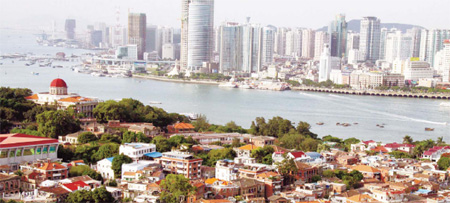Focus
Working rules to protect living history
By Wei Tian (China Daily)
Updated: 2010-08-26 15:52
 |
Large Medium Small |

The old-fashioned streets of Gulangyu stand in stark contrast to the glitzy, modern buildings of Xiamen. Zhu Xingxin / China Daily |
How officials and residents are keeping the peace on Gulangyu. Wei Tian reports.
In Gulangyu, which sits off the east coast of Fujian province, two things are missing: Petrol-powered vehicles and modern buildings.
Despite the skyscrapers and spaghetti junctions piling up in the special economic zone (SEZ) across the channel in Xiamen, the island is a living museum thanks to its 19th century villas and traffic-free roads.
"Some say life in Gulangyu represents the spirit of Xiamen," said Yuan Xusheng, who runs the Four Season Flowers, a family inn in the northeast part of the island. "It's not too big and not too fast."
| ||||
Although Chinese merchants bought most houses after the colonial era, many were left untouched when the owners went abroad in 1949. The Four Season Flowers, which opened last year, is in a three-story, 15-room mansion built in 1923 that was once the home of the servants who worked for the island's United States consulate.
According to official statistics, 70 percent of the original buildings on Gulangyu are private properties. Some are used as hotels or occupied and others are partially abandoned.
However, the authorities have struggled with the protection of historic buildings in need of repair.
"We were the first (government) in China to introduce legislation on the protection of old buildings," said Zheng Huisheng, deputy director of the Gulangyu management committee. "We also started a win-win system that allowed businesses to fix old structures and make use of them."
Initial rules stipulated owners or occupiers were responsible for repairing their properties, but Zheng's department discovered many had emigrated and lost contact, and some were unwilling to cooperate.
Instead, in March last year, the Xiamen People's Congress approved plans to introduce a government trusteeship to take charge of buildings whose ownership was unclear, as a way to protect "common properties."
"The new rules are very strict on the protection," said Yuan from behind his hotel's Mediterranean-style reception desk. "When I was about to refurnish the hotel, I was told to leave the exterior exactly how it is.
"Obviously foreigners are attracted to the island's old buildings. There was a Japanese writer who lived (at the hotel) for more than a month and even wrote a book about the island."
The writer he was referring to is Ayako Ishimoto, author of Paradise for Cats and Pianos, which offers travel tips about customs, food and sights on the island. "That book has brought a number of travelers from Japan, who asked specially to live in my hotel," said Yuan, who signed a 10-year lease on the property that costs 20,000 yuan a month.
Gulangyu is home to about 16,000 permanent residents and receives roughly an equal number of tourists each weekday, with about 50,000 on weekends and public holidays.
In 2003, the Xiamen government planned to levy an 80-yuan fee to enter the island, which sparked protest among residents as they insisted Gulangyu should still be a functional part of the city rather than a tourist spot. The plan was eventually suspended, although the ferry price rose from 3 yuan to 8 yuan.
With high-speed railways starting services in April this year, travel times from Xiamen to surrounding cities have been greatly reduced, meaning many more people are expected to flood into the popular city in the future.
Yuan hopes Gulangyu does not prove too welcoming, though. "I want the island to remain a peace and quiet resort," he said. "So maybe it's time we try some tourist traffic control."



